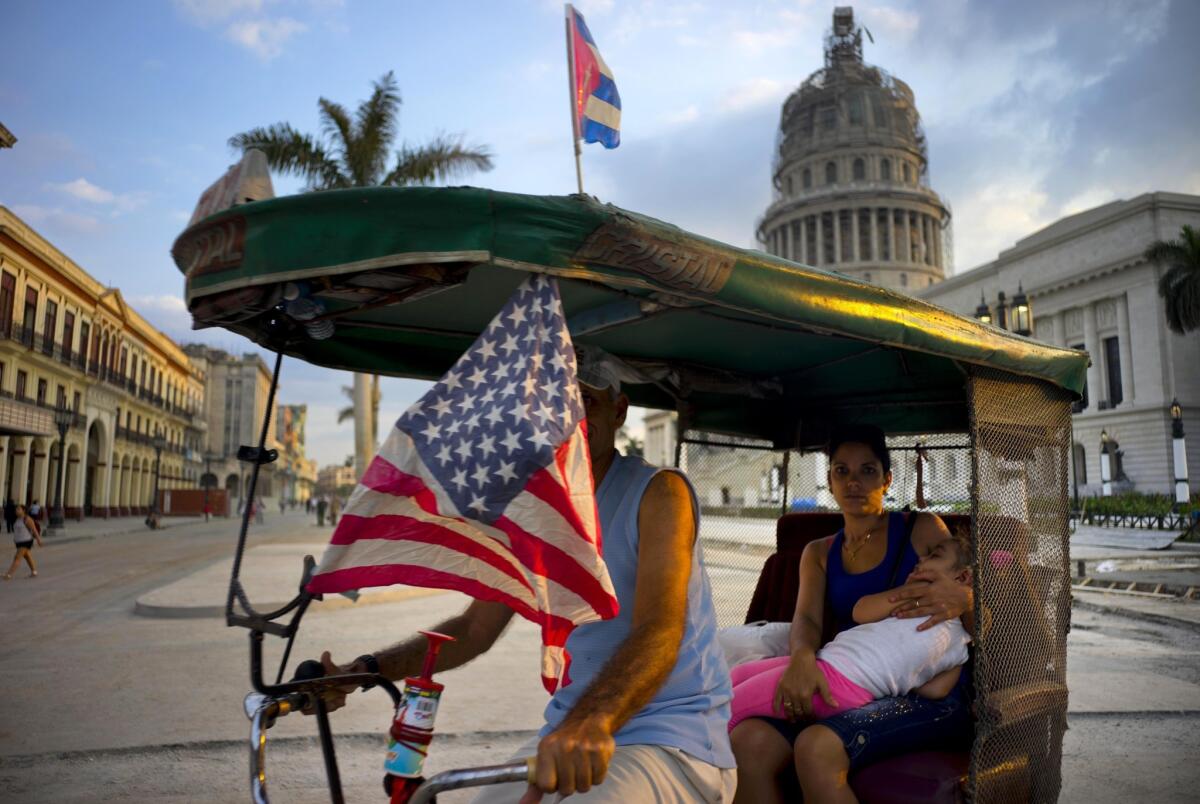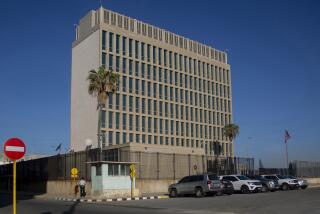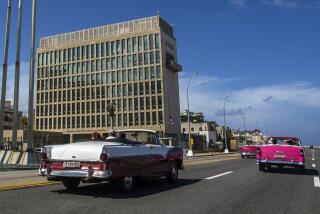Yes, America, you can still visit Cuba. And the feds have softened their warnings

After months of urging American travelers to avoid Cuba and noting that mysterious attacks caused ailments among U.S. Embassy workers there, the U.S. State Department on Thursday softened its language and instead recommended visitors use “increased caution.”
The agency continues to blame the maladies on deliberate attacks, perhaps sonic, in late 2016 and 2017, but “we are unable to identify the source,” the travel advisory noted.
The change in status moves the island nation from the State Department’s Level 3 (“reconsider travel to Cuba”) to Level 2 — the same label currently attached to Mexico and Colombia, where crime concerns are cited.
“It’s significant,” said Tom Popper, president of tour company InsightCuba. “It’ll make some people feel more comfortable.”
The move follows four years of dramatically changing fortunes for Cuba’s travel industry.
Curious travelers raced in and airlines and cruise lines and hotels rushed to capitalize on then-President Obama’s loosening of longstanding restrictions in 2014. Then came 2017, bringing tough talk about new restrictions by the Trump administration, revelation of the embassy illnesses and damages from Hurricane Irma in September.
Non-family visits by Americans to Cuba dropped 24% in the first half of 2018, Reuters has reported. Alaska Airlines, which started daily flights between LAX and Havana in January 2017, stopped them in January 2018.
Although nobody’s certain what to expect next, experts say travelers can count on two things:
First, there will be cruise ships.
Second, it’s still possible to visit Cuba as an independent traveler or with a group. You can fly on a U.S.-based airline and, for that matter, return with cigars and rum. But fewer people are doing it.
By Reuters’ figures, about 266,000 travelers made the journey to the island from January through June. Overall tourism to the island nation was down about 5% during that time, despite a 45% increase in travelers arriving by cruise ship.
Cuba-watchers say you can blame some of the slump in American visitors on Hurricane Irma. Others say Cuba’s popularity was bound to cool off after the rush of first-time visitors in recent years. But several travel industry veterans said they trace most of the slowdown to fears over the embassy illnesses and the Trump administration’s tough talk against the nation’s Communist leaders.
Even though the administration’s revisions to Cuban travel policy wound up being relatively minor, they said, Trump’s rhetorical attacks against the nation’s Communist leaders hit hard.
“A lot of people seem to be under the assumption that Trump slammed the door shut,” said author Christopher P. Baker, who wrote the current Moon Cuba guidebook and has led Cuba trips for six tour operators. “For tour companies, it’s really been a bit of a disaster.”
Janet Moore, owner of the Long Beach-based tour operator Distant Horizons, said in an email that her Cuba bookings are down about 40%, “even though in reality the restrictions didn’t really change at all.”
Many statistics are hard to come by, partly because some Americans make covert visits to Cuba by way of Mexico. But Moore and Baker and two other Cuban travel and trade professionals said they thought American individual travel to Cuba also had decreased, though less steeply than group travel.
Trump first vowed to tighten limits on Cuba in June 2017, saying he was “canceling the last administration’s completely one-sided deal,” made by President Obama in 2014. When the specific policy revisions went into effect in November, they were less dramatic than that. Airlines and cruise lines could still carry Americans to Cuba, for instance, and Americans could still bring back rum and cigars.
The only substantial change, tour operators said, was a new ban on direct dealings with dozens of hotels, stores, tourist agencies and other enterprises linked to Cuban military and intelligence agencies.
And then there were those ailing embassy workers. About 25 staffers reported maladies including hearing loss, headaches and fatigue, prompting the State Department to withdraw most of its personnel from Havana in 2017. FBI investigators were unable to find a cause for the injuries, and Cubans officials have denied responsibility.
After the Trump and embassy headlines, “It was incredible, the amount of people who thought [Cuba as a destination] was done,” said InsightCuba’s Popper, who estimated that his company took 5,500 passengers to the island in 2016 and about 3,000 in 2017.
Since May, Popper said, the slump has been turning around, and “now we’re in our fourth straight month of double-digit growth.”
Although the laws haven’t changed much, “the hassle component is higher than with most other destinations,” said John Kavulich, president of the U.S.-Cuba Trade and Economic Council.
“The beneficiaries have been the cruise lines,” Kavulich said, noting that they can give passengers a U.S. government-approved glimpse of the island while largely shielding them from the subtleties of U.S.-Cuba travel restrictions.
Cruise traffic to Cuban ports, which restarted in 2016 after a hiatus of nearly 40 years, these days include ships from Carnival, Holland America, Norwegian Cruise Line, Royal Caribbean and others.
What does all this mean for a traveler considering Cuba?
First, it’s still a illegal for Americans to be old-fashioned tourists there. That’s an outgrowth of a U.S. embargo that dates to the early years of Fidel Castro’s Communist regime in the 1960s.
Although many restrictions were loosened, an American traveler to Cuba still needs to build a trip that falls under one of 12 “categories of authorized travel” as defined by the Treasury Department’s Office of Foreign Assets Control. (Among them: family visits, government business, journalism, educational activities, religious activities.)
If your trip falls under one of those categories, you need not seek a license in advance. But it would be wise to keep good notes what you did on the island.
Second, solo travelers should know that Treasury officials have a new term for those who are permitted to visit Cuba on their own, without a group or family affiliation. Those trips used to be considered “people to people” educational activities. Now they’re known as “Support for the Cuban People” trips.
To legally make such a trip, the Treasury Department says, travelers must arrange and document a full-time schedule of activities that promote democracy or strengthen civil society and involve “meaningful interaction” with Cuban individuals.
This could include stays in private Cuban residences (known as casas particulares) and meals at privately owned Cuban restaurants (known as paladares). But no advance paperwork is required.
“Anyone can go to Cuba as long as they tick the ‘Support [for] the Cuban People’ box when buying their tickets,” Moore said.
Third, despite the recent slump, the travel marketplace in Cuba has been growing fast for several years, which gives visitors more options.
Tourism officials counted about 4.7 million international visitors last year, about 619,000 of them Americans. Baker noted that Cuba has a growing variety of small lodgings and hundreds of Airbnb listings, many of which are priced below the rates at larger hotels.
Fourth, if you do go to Havana, the State Department urges visitors to avoid the Hotel Nacional and Hotel Capri, where some of the mysterious sonic attacks are said to have occurred.
Fifth, if you’re thinking about slipping into Cuba by way of Mexico and withholding that information from the U.S. government when you return, remember that it’s still illegal.
The Treasury Department isn’t the only U.S. agency that could punish you or withhold privileges.
As one couple recently learned after acknowledging a previously undisclosed Cuba trip, U.S. Customs and Border Protection officials won’t issue a Global Entry card (designed to speed the passage of trusted travelers through Customs lines) to anyone it believes is lying or withholding information.
christopher.reynolds@latimes.com
Follow Reynolds on Twitter: @MrCSReynolds
More to Read
Sign up for The Wild
We’ll help you find the best places to hike, bike and run, as well as the perfect silent spots for meditation and yoga.
You may occasionally receive promotional content from the Los Angeles Times.







